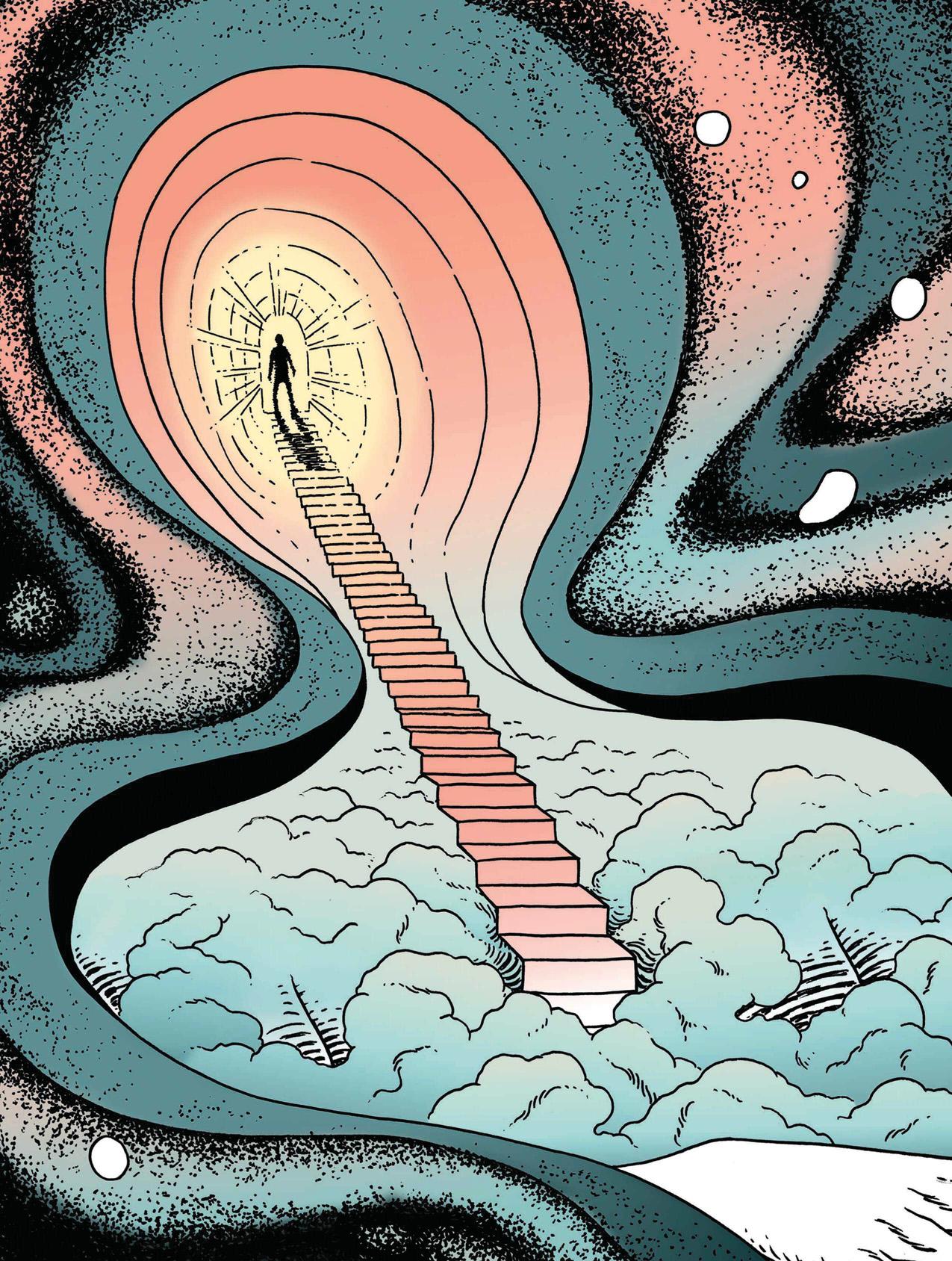Prøve GULL - Gratis
BEHIND DEATH'S DOOR
BBC Science Focus
|March 2025
They leave their bodies, witness a bright light and return forever changed. But do survivors of near-death experiences truly glimpse the great beyond? New research into the brain's final moments could decode these visions at life's edge

I'll never forget the day the neuropsychiatrist Dr Peter Fenwick visited my undergraduate psychology class in the 1990s. Tall and dapper with a refined voice and neuroanatomical terms tripping from his lips, Fenwick conveyed old-school authority.
One of the subjects he lectured us about was so-called near-death experiences. Originally a sceptic, he said there was now compelling evidence that many people close to death were able to recall seeing themselves from above. Even more astonishing, some described witnessing events in distant parts of the hospital – things they couldn’t have seen unless their consciousness had somehow separated from their physical bodies. Something about his erudite, understated delivery sent shivers down my spine.
Plenty more research has since explored near-death experiences (NDEs) – episodes of bodily disconnection, spiritual revelation, and intense emotions reported by those who come close to death and survive. Turns out they could be incredibly common: one recent survey reported that 15 per cent of patients in intensive care had experienced a NDE.
NDEs are by no means a new phenomenon, however. The scholar Dr Gregory Shushan has collected accounts of NDEs through time and across cultures, finding numerous examples, from 7th-century BC China to 19th-century Ghana. Hieronymus Bosch’s 16th-century painting Ascent of the Blessed is widely considered a visual portrayal of a NDE.
The concept first really came to prominence in the 19th century when the Swiss geologist Prof Albert von St Gallen Heim collected stories from fellow climbers who nearly died. The US psychologist Dr Raymond Moody then popularised NDEs with his 1975 book Life After Life, which Fenwick dismissed at the time as “psychobabble” before encounters with NDE-ers changed his mind.
Denne historien er fra March 2025-utgaven av BBC Science Focus.
Abonner på Magzter GOLD for å få tilgang til tusenvis av kuraterte premiumhistorier og over 9000 magasiner og aviser.
Allerede abonnent? Logg på
FLERE HISTORIER FRA BBC Science Focus

BBC Science Focus
ARE PSYCHOPATHS REALLY THAT GOOD AT LYING?
Picture infamous psychopaths from fiction, such as the eerily cold and calculating Patrick Bateman in the film adaptation of American Psycho, and they certainly seem like master deceivers. But what about real-life psychopaths? Research confirms that psychopaths are more inclined to lie to get what they want, and that they typically display a striking fearlessness - as if they have ice running through their veins.
1 min
January 2026
BBC Science Focus
WHY DO WE HAVE TWO OF SOME ORGANS, BUT ONLY ONE OF OTHERS?
The majority of animals on Earth, humans included, are bilaterally symmetrical. It means we can be divided roughly into two mirror-image sides. Evolutionary biologists believe that it has been like that for at least 300 million years, and because life organised this way survived, so did symmetrical design. Hence, two eyes, two ears, two lungs and two kidneys.
1 min
January 2026

BBC Science Focus
WHY DO CATS PREFER TO SLEEP ON THEIR LEFT?
I've said it before, and I'll keep saying it again and again and again: who knows why cats do anything?
1 min
January 2026

BBC Science Focus
FORGET COUNTING CALORIES TRY THIS INSTEAD...
Calorie counting isn't just difficult, it's riddled with problems that make it practically useless for anyone trying to lose weight.But there are alternatives
9 mins
January 2026

BBC Science Focus
SIGNS OF LIFE
The more planets we find outside our Solar System, the better our chances are of finding life on one of them. But if there really is life out there, how do we spot it?
8 mins
January 2026
BBC Science Focus
WHAT ACTUALLY MAKES SOMEBODY COOL?
Most of us have probably wanted to be cool at some point in our lives, and these efforts can have a big influence on the things we buy, the way we dress, the hobbies we invest in, the people we look up to and even the words we use.
2 mins
January 2026

BBC Science Focus
It's TIME to WAKE UP and SMELL the roses
What if the pursuit of happiness in the traditional sense – chasing wealth or power – is the very thing stopping you from being happy? Researchers are beginning to understand that spending time enjoying the simple things might be the secret ingredient to enjoying a happy, healthy life
8 mins
January 2026

BBC Science Focus
THE AARDVARK
In a time when people are being asked to consider eating insects, we should, perhaps, learn a thing or two from the aardvark (Orycteropus afer), Africa’s ant-guzzling gourmand. On an average night, the big-schnozzed mammal devours up to 50,000 of the crunchy critters.
2 mins
January 2026

BBC Science Focus
ADD WEIGHT TO LOSE WEIGHT
A very basic kind of wearable could make your New-Year-weight-loss plans stick
3 mins
January 2026

BBC Science Focus
AHEAD OF THEIR TIME
The Maya civilisation is known for its art and architecture.
8 mins
January 2026
Listen
Translate
Change font size

